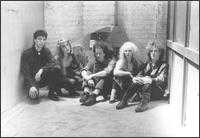Game Theory formed on the fringe of the Paisley Underground movement of the early-'80s and though they certainly had a retro-'60 sound with psychedelic leanings, the band owed its greatest debt to the proto-power pop of Big Star.
Leader Scott Miller's song craft, distinctive voice (self-described as a "miserable whine") and intelligent lyrics (often obscure but rarely pretentious) carved a sound that, while firmly rooted in traditional pop, was truly original and defined an era of college rock.
Formed in Sacramento in 1982, the first incarnation included ex-Alternative Learning member Scott Miller (singer/songwriter, guitarist), Fred Juhos (bass), Nancy Becker (keyboards), and Michael Erwin (drums). Within four months of forming and before ever playing a live gig, the band recorded their first album, Blaze of Glory, in Miller's bedroom. Only 500 copies were pressed and sent out to college radio (according to the legend, wrapped in trash bags). The album, while a pleasant amalgam of '60s pure pop and the quirkier elements of new wave, only hinted at the band's potential. They began playing live in the same circles with Dream Syndicate and Thin White Rope -- rumblings of the Paisley Underground scene were just beginning. The Pointed Accounts of People You Know EP in 1983 and the Distortion EP (produced by Michael Quercio of paisley-peers the Three O'Clock) the following year quickly earned the band a following and drew favorable comparisons to Big Star.
In 1985, with the help of producer Mitch Easter, they recorded their first proper album -- Real Nighttime -- for Enigma Records. Internal tensions broke the band up before its release, leaving Miller to carry on with a new lineup consisting of Shelley LaFrenier (keyboard), Gil Ray (drums), and Suzie Ziegler (bass) -- Easter would continue as the band's producer and essentially a fifth member in the studio throughout the rest of their career. The new group immediately began recording Big Shot Chronicles by late 1985 -- the album once again showing great leaps in quality. By this time, they had become staples of college radio, though mainstream recognition eluded them. Miller seemed to accept the destiny of the band (obscurity) when he created his most excessive, and ultimately most enjoyable, album -- 1987's Lolita Nation -- a sprawling double album packed with obscure pop-culture references, and riddled with experimental sounds and song fragments. Lolita Nation also marked the addition of guitarist/vocalist Donnete Thayer.
They took one more stab at the mainstream with the more accessible Two Steps From the Middle Ages in 1988, but its commercial failure took its toll on the band, leading to several more personnel changes -- which included the temporary exit of Miller himself. Miller finally dissolved the band in 1990 to form the similar-sounding, though more ecclectic, Loud Family.
Source: http://www.allmusic.com/cg/amg.dll?p=amg&sql=11:jifexqe5ldke~T1
